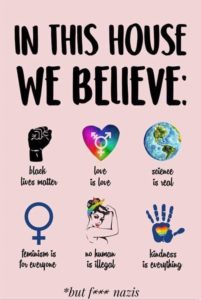How will the world know who I am? How will the world know what I believe?
Growing up as a Protestant, I knew a few certain things about love:
- Jesus loves me, and I love Jesus
- Love your neighbor
- Tell other people that Jesus loves them, too
One of the chosen names of modern Protestant Christianity is ‘Evangelical Christianity.’ It denotes those who follows the message of the ‘Good News’ (Gospel) and who spread the Good News. Inherent to the idea of Protestant Christianity (or at least for me, growing up) is that your faith in Jesus Christ is never a personal one that you keep all to yourself. It is about sharing, sharing, and sharing. Not everyone is called to be a missionary that gets shipped out overseas, but you should be ready to try it out, and at the very least you should be a missionary to your friends around you.
This image of ‘missionary’ was pressed so hard on me that I often wondered what was so wrong of me to not join up on every single mission trip I heard about, and why I was so bad at telling my friends about Jesus. In short, it was those questions above that I thought most about: How will the world know who I am? How will they know what I believe?
As a child I was of course no theologian. I didn’t even know what a theologian was, much less that being one was a serious affair. For all I knew, it just meant you were really really good at reading the Bible, not that it had anything to do with outside argumentation and academic work. Yet even then I didn’t think that sharing the faith was a matter of arguing about truth, it was a matter of experience, and having a convincing experience.
In retrospect I now realize that I was coming of age in a time that was riding on the curtails of the rise of New Atheism. Since Protestantism isn’t exactly founded in a rich and firm tradition of theology and philosophy, the general response from theologically illiterate Christians was to resort to use ‘faith’ against New Atheists. An Atheist can bring up arguments that disprove God’s existence, and they could tell you having ‘faith’ was an aspect of the simple minded, but by American right they couldn’t tell you what to believe. And faith is what I went with.
Yet faith, as its own notion, is really difficult to share with others. You can share your experience, but we are all so unique. Sharing your ‘testimony’ (as it is known) of your faith journey may have an impact for some, but not necessarily any more than that.
Towards the end of middle school and definitely by the end of high school, I had what I thought I understood to be the answer: Love. Love is how you preach the faith.
Now objectively speaking, love is a hallmark of Christian faith. Literally since the inception of Christianity, love is what made Christians stand out. For the more selfish pagans, the self-sacrificing love of Christians was a bit of a mind-blowing concept. Sacrifice was a commonly held notion in pagan culture (which helped facilitate conversion to Christianity), but not self-sacrifice. Corruption was a common assumption, even for many years afterwards in the Roman Empire, and the idea that you would give up what you had for others was opposite of what you would expect.
In many ways, from that time until now, that idea is still very true. Selfishness is an inherent tendency within the human person, and sacrificing that selfishness for the good of others is exactly counter-human (if not counter-cultural).
The idea of evangelizing through love, service, and sacrifice, is that by living a life so centered around Christ, and not yourself, you make people curious and want to buy-in to whatever belief system you have. By being so radically centered around love, you become the lighted city on top of the hilltop, shining into the darkness around you. All will gather around the light, simply because it exists and is baffling for its generosity. While I say many things facetiously, realize that this is not. Radical selfless love is necessary for Christian evangelization.
Recently, though, I’ve wondered about this. Is this truly the way to evangelize to our modern time? Do I work through charity and charity alone, in the form of service and kindness, so that I bring thousands to baptism? It worked in the Roman Empire, it worked for Mother Teresa and it works for her order the Missionaries of Charity, but what about in the United States?
In many ways, I would like to present the idea that American culture has moved to the point of accepting that love and service are, or should be, just normal characteristics of a good person. Self-sacrifice is exactly the quality of a hero personality. If you want to be a recognizably good person, you just do these things. One of the hallmarks of modern thought is “I don’t have to be religious to be a good person.” In many ways this can be an excuse to just not be a religious or a good person, but overall people still strive to be that ‘good person,’ if for no other reason than the fact that it’s just expected for people to be that way.

In other words, if you’re loving, serving, and self-sacrificing in the modern day, well…people just say ‘Cool, good job. Keep it up. You’re a good person.’ and they move on. If you don’t do these things then you’re just not a good person and nobody likes you. PBS Kids is entirely built on the idea of teaching kids to be ‘moral’ and ‘good’ without any attachment to the idea of religion, and news stories will circle occasionally about a few kids or young adults who did a really great service, and that their work is amazing.
So what’s the point of using love as a point of evangelization? No one cares anymore. It’s the norm and it’s expected. It brings nothing of note to the conversation and doesn’t necessarily do anything to bring others closer to Christ. What’s more is it has created apathy. Not only do people stand back and say ‘well I’m living a faith-filled life, so I’m fine’ but also ‘well people will see my faith-filled life and they can ask about it if they want to.’ They get filled with sloth!
“Always be prepared to make a defense to any one who calls you to account for the hope that is in you, yet do it with gentleness and reverence” (1 Peter 3:15, RSVCE).
My belief is that the Devil has had a serious victory in the ‘progress’ of modernity. Not only have many fallen away from leading a faith-filled life, but the Devil has made it so that living a virtuous life almost seems to fade into the background. It is not of note to just live out a virtuous life, simply because ‘that’s just what good people do, religion or not.’
But if we can’t use love as the primary point of evangelization, what do we use? My answer is theology. My friends, the world will not know us through our love but what we teach. I say this, not talking about preaching a simple message of love. I say this talking about our rich tradition that is nearly 2,000 years old, pulling out the rich intellectual history that belongs to us as Christians. Bishop Barron has been saying this for a long time, blaming a dumbing down of the faith that occurred in the latter half of the 20th century for much of the loss of religion in modern times.
Now, more than ever, people need to see that Christianity is a religion of no shallow faith. We are a religion with a strong tradition of knowledge, philosophy that bows to theology, that has resolved many of the questions of man’s spiritual ailments through Divine intervention and nearly 2,000 years of study of that Divine revelation, guided by the Holy Spirit.
One of the revelations made to me, that kickstarted my whole discovery of Catholicism, is the fact that Catholicism has possessed, since the 13th century, not one, not two, not three, but five distinct philosophical proofs for the existence of God. Religion never developed because of an ignorance of knowledge, it was coaxed to existence in relationship to knowledge.
Christian teaching, Christian doctrine, is filled with a long list of other-worldly beliefs. We eat the sacrificed flesh of the God-man Jesus Christ. Our God is three persons in one essence. Our God is the Creator and Sustainer of the universe. The purpose of man is first and foremost to know and worship God. The Christian people participate in and become the Body of Our Lord Jesus Christ. We can communicate with our Christian brothers and sisters who are in Heaven. Our God is not A being but IS being itself. There are only two kinds of people in the end: those who say to God, “Thy will be done,” and those to whom God says, in the end, “Thy will be done.” [The Great Divorce, C.S. Lewis].
All of these beliefs also have mountains of theological and philosophical backing – they aren’t just random shots in the dark, a desperate grasp for an answer to the question of ‘how does lightning/an earthquake/a hurricane happen?’
My friends, they will not know us through our love, they will know us through what we teach. I dazzle more people with the mere fact that I hold any strong religious beliefs than I dazzle them by being nice.
Of course, the only caveat I make is that we must follow that latter part of Peter’s encouragement: yet do it with gentleness and reverence. Just because they will not know us through our love does not mean that we are excepted from having Christian love. As I stated, true love, caritas or agape, is a hallmark of the Christian faith. If we didn’t have it, we wouldn’t be the Christians we claim to be.
It’s not hard to learn some basic theological facts about your faith, and it’s not that hard to share them. You don’t need to be an advanced scholar to know of a good book reference here and there to direct conversation with someone. It is biblical, in fact, for us to follow Peter’s direction:
“Always be prepared to make a defense to any one who calls you to account for the hope that is in you, yet do it with gentleness and reverence” (1 Peter 3:15, RSVCE).

